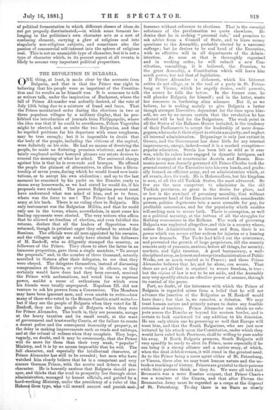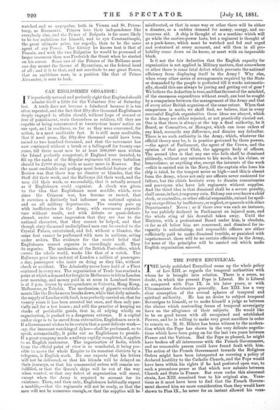THE REVOLUTION IN BULGARIA.
ONE thing, at least, is made clear by the accounts from Bulgaria, and that is that the Prince was right in believing that his people were as impatient of the Constitu- tion and its results as he himself was. It is nonsense to talk as writers talk, under the inspiration of Bucharest, where the fall of Prince Alexander was ardently desired, of the vote of July 13th being due to a mixture of fraud and force. That the Prince maintained order during the elections in two or three populous villages by a military display, that he pro- hibited the introduction of journals from Philippopolis, where the idea was that if he could be overthrown, Prince Vogorides might be elected, and so unite the two Bulgarias, and that he repelled petitions for his departure with some roughness, may be true enough; but it is impossible to doubt that the body of the people, including the citizens of the capital, were definitely on his side. He had no means of deceiving the people, he made no flattering promises whatever, and he cer- tainly employed neither honeyed phrases nor astute devices to conceal the meaning of what he asked. The universal charge against him is that he is over-rude and brusque. He offered the people the plainest of alternatives, to allow him a Dicta- torship of seven years, during which he would found new insti- tutions, or to accept his own abdication ; and up to the last moment he remained by his yacht on the Danube, ready to steam away homewards, as we bad stated he would do, if his proposals were refused. The poorest Bulgarian peasant must have understood what was asked of him, and as to force,
where was the force to use The 'Prince had no foreign army at his back. There is no ruling class in Bulgaria. His only instrument was the Bulgarian Militia, and that he could only use in the towns, where, nevertheless, in most cases his leading opponents were elected. The very writers who affirm that he allowed no freedom of election, and even falsified the returns, declare that all the leaders of Opposition were returned, though in petulant anger they refused to attend the Sessions. The officials were all men appointed by his enemies, and the villagers might as easily have elected the followers of M. Zankoff, who so diligently stumped the country, as followers of the Prince. They chose to elect the latter in an immense proportion, gave them a single mandate, "To accept the proposals," and, to the number of three thousand, actually marched to Sistova after their delegates, to see that they were obeyed. The delegates themselves, instead of discussing compromises at Sistova, or even voting in silence, as they certainly would have done had they been coerced, received the Prince with acclamations, and voted him to supreme power, amidst a scene of enthusiasm for which even his friends were totally unprepared. Napoleon III. did not venture to ask his powers from a Convention. The Members may have been ignorant men, and even unable to write—how many of those who voted in the Roman Comitia could write ?— but if they are the people of Bulgaria when they voted for M. Zankoff, they are the people of Bulgaria when they vote for Prince Alexander. The truth is, they are peasants, savage at the heavy taxation and its small result, at the want of government and trustworthy Courts, at the failure to create a decent police and the consequent insecurity of property, at the delay in making improvements such as roads and railways, and at the refusal of .redress when they complain. They hope, vaguely, no doubt, and it may be erroneously, that the Prince will do more for them than their very weak, " popular '' Ministry, and it is by no means impossible that he will. The full character, and especially the intellectual character, of Prince Alexander has still to be revealed ; but men who have watched him closely believe that he is a competent and very sincere German Prince, with the merits and defects of that character. He is honestly anxious that Bulgaria should pro- sper, and thinks that the road to prosperity lies through strict administration, managed by honest official; and guided by a. hard_wçirking Ministry, unçler the presidency of a ruler of the Hohen alem type, who will reward success and puniah,mal-, feasance without reference to elections. That is the essential substance of the proclamation we quote elsewhere. He denies that he is seeking "personal rule," and promises to ask advice from a Council of State, and to leave money questions to the Assembly, probably elected by a narrower suffrage ; but be desires to be real head of the Executive, with an effective will in all departments of the Admin- istration. As soon as that is thoroughly organised and in working order, he will submit a new Con- stitution, resembling, it is believed, the Prussian, to the great Assembly, a Constitution which will leave him much power, but not that of legislation.
If Prince Alexander is dishonest, which his bitterest critics do not allege, or is the tool of a party in St. Peters- burg or Vienna, which he angrily denies, cadit quaestio, the sooner he falls the better. In the former case, he will plunder Bulgaria for himself ; and in the latter, waste her resources in furthering alien schemes. But if, as we believe, he is seeking mainly to give Bulgaria a better though stronger Executive, dependent for the time upon him- self, we are by no means certain that the revolution he has effected will be bad for the Bulgarians. The weak point in all the States of the Balkans, Greece included, is the tendency of their Parliaments to accept the leadership of mere dema- gogues, who make it their object to obtain a majority, and neglect all internal administration. Brigandage is only just extinct in Greece, and the Government has done little for any internal improvement, except, indeed—and it is a marked exception— popular education. Servia has been left as wild as it ever was, while its rulers have engaged in dynastic intrigues, and efforts to support or countermine Austria and Russia. Rou- mania never was decently governed till Prince Charles took the general control of the Executive into his own hands, and gradu- ally formed an efficient army, and an administration which, at all events, does its work. He is Hohenzollern, but his kingdom is now, of all the old Turkish States, the most advanced. So few are the men competent to administer in the old Turkish provinces, so great is the desire for place, and so low is the standard of pecuniary morality, that without a permanent head of the Executive invested with considerable powers, politics degenerate into a mere scramble for pay, for profitable concessions, and for the popularity which enables self-seeking men to secure both. There is corruption, as well as a political meaning, at the bottom of all the struggles for Railway concessions in the Balkans. The work of governing Bulgaria was neglected altogether, and this in a country where, unless the Administration is honest and firm, there is no power which can secure either redress for injuries or a hearing for new demands. The Turks had killed out the aristocracy, and prevented the growth of large proprietors, till the country consists only of peasants, anxious, before all things, for security, markets, and light taxation. A good bureaucracy, a well- disciplined army, an honest and energe tic administration of Public Works, are as much wanted as in France ; and these Prince Alexander believes that he, and he alone, can secure. That these are not all that is required to secure freedom, is true ; but the re'yinze of law is not to be set aside, and the Assembly may very speedily obtain an effective power of censure, through its control of the purse.
Part, no doubt, of the bitterness with which the Prince of Bulgaria is regarded arises from a belief that he will not advance the junction of the Bulgarias as M. Zankoff would have done ; but that is, we conceive, a delusion. We may trust human nature and princely nature to desire any feasible extension of territory. Prince Alexander can obtain no sub- jects across the Danube or beyond his western border, and is certain to look southward for any addition to his dominion. He can only obtain one by governing so well that Europe will trust him, and that the South Bulgarians, who are just now irritated by his attack upon the Constitution, under which they would have ruled both Provinces, shall be willing to pass under his sway. If North Bulgaria prospers, South Bulgaria will very speedily be ready to elect its Prince, more especially if he can bring it a strong alliance and a native army, of which, when the final debacle comes, it will stand in the greatest need. As to the Prince being a mere agent either of St. Petersburg, or Vienna, there also we may trust human nature and the un- broken teachings of history. Princes are grateful to theirpatrons while their patrons think as they do. We were all told that Roumania was a mere Russian outpost, that Prince Charles was a nominee of the Courts, and that after Plevna the Roumanian Army must be regarded as a corps at the disposal .of St. Petersburg. To-day there is no State so closely
watched and so unpopular, both in Vienna and St. Peters- burg, as Roumania. Princes lore their independence like everybody else, and the Pr:nce of Bulgaria is far more likely to be too ambitious for himself, and to eye Constantinople, the great ultimate prize, too eagerly, than to be the mere agent of any Power. The history he knows best is that of Prussia, and with the two Bulgarias he would be possessed of larger resources than was Frederick the Great when he started on his career. Some one of the Princes of the Balkans must one day mount the throne of Byzantium, as the federal head of all ; and it is to that, and not servitude to any great Power, that an ambitious man, in a position like that of Prince Alexander, is sure to look.



































 Previous page
Previous page